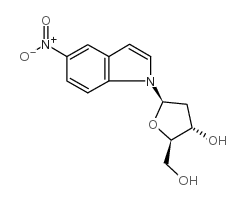| Description |
5-NIdR (1-(β-D-2-Deoxyribofuranosyl)-5-nitroindole), an artificial nucleoside, exhibits the ability to inhibit the replication of DNA lesions generated by Temozolomide (HY-17364). 5-NIdR induces cancer cells apoptosis and arrests cell cycle at G0 phase. 5-NIdR enhances Temozolomide anti-tumor efficacy in murine glioblastoma model[1].
|
| Related Catalog |
|
| In Vitro |
5-NIdR (12.5-100 μM;24-72 小时) 以剂量依赖性方式抑制人胶质母细胞瘤细胞系(U87、A172 和 SW1088)的生长[1]。 5-NIdR (1-100 μg/mL;72 h) 在 U87 细胞中诱导细胞凋亡,并以 100 μg/mL 的浓度过夜孵育,使细胞周期停滞在 G0 期[1]。
|
| In Vivo |
5-NIdR (100 mg/kg;腹腔注射;连续 5 天) 与替莫唑胺 (40 mg/kg) 联用,在胶质母细胞瘤小鼠异种移植模型中导致肿瘤完全消退。而 Temozolomide 单独使用,只能延迟肿瘤的生长[1]。
|
| References |
[1]. Choi JS, et al. Inhibition of Translesion DNA Synthesis as a Novel Therapeutic Strategy to Treat Brain Cancer. Cancer Res. 2018 Feb 15;78(4):1083-1096.
|
